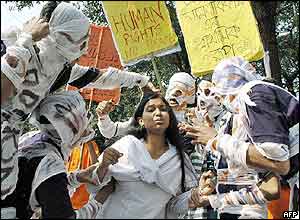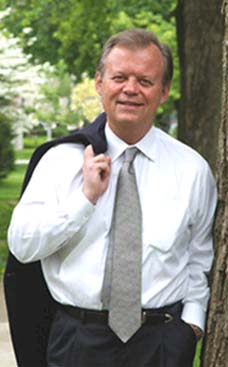
"I can't tell you the name of the beggar woman, nor do I know the precise reason behind what happened to her. I do know that she was the victim of an acid attack. Such attacks occur here for one of two reasons: because a woman refuses a proposal from a man and he wants to ensure that she never marries, or her family does not give her husband a large enough dowry. Such treatment was among the many topics discussed during the gender issues training portion of my Peace Corps orientation in Dhaka, Bangladesh."
RPCV Abbey Brown writes about the Culture Shock of acid attacks on women in Bangladesh
Culture shock of a Peace Corps woman
ABBEY BROWN
Caption: Human rights groups in Bangladesh stage an acid attack scene on a woman to attract onlookers. Photo: BBC
After living a month in Bangladesh, I thought I'd seen everything. I was certain nothing could shock me anymore. Then she knocked on my window.
I was on the train, and she'd come to my window, begging for money. Her face was horribly scarred. Unlike so many other beggars I've forgotten, her face will be burned into my memory, along with pain, horror and a marked feeling of gratitude for all I have.
Her skin was melted, her features displaced. She had a look in her eyes that communicated the terror she had lived and the hopelessness she felt.
Two months later, I sat across from another woman, Gazi Nasrin Akter - beautiful, educated, sophisticated and wealthy. She and the beggar woman were completely different, yet both shared an elemental similarity that determines everything in their lives: they are women in a country and culture that significantly marginalizes their gender.
I can't tell you the name of the beggar woman, nor do I know the precise reason behind what happened to her. I do know that she was the victim of an acid attack.
Such attacks occur here for one of two reasons: because a woman refuses a proposal from a man and he wants to ensure that she never marries, or her family does not give her husband a large enough dowry. Such treatment was among the many topics discussed during the gender issues training portion of my Peace Corps orientation in Dhaka, Bangladesh.
Akter said she knows such attacks frequently occur. I spoke with her about her feelings on gender issues when I met her, two months after I saw the beggar woman. The 28-year-old Akter said she considered herself lucky.
"Well, lucky means I am mostly happy and haven't been hurt like this," she said hesitantly when asked what she meant by "lucky." She also talked at length of how frustrating her role as a Bangladeshi woman can be - always considered a second-class citizen, constant harassment and having to get permission from not only her husband, but her father- and mother-in-law to do anything, be it cooking a meal, going to the market or walking down the street to visit a friend.
"But usually they let me do these things," Akter said. "I am lucky. For many (women), they can't do anything."
Akter said the fact that she was able to marry a man she knew and loved made her lucky. "The Muslim faith and Bangladeshi culture mandates that marriages be arranged," Akter said. "But I got around it." She met her husband when she was 23, while attending Dhaka University. When she realized that she loved him, Akter went to an aunt she was close to and told her of the man.
"I trusted her," Akter said. "I knew she wanted me to be happy. So she approached my father and said she had found this boy. And made it seem as if it was her idea. It worked."
Akter, mother of a 1-year-old, worked as an English teacher for five years. She quit after she became pregnant. Twenty-six-year-old Tanik Munir used words such as challenging, difficult and unbearable when describing life as a Bangladeshi woman.
"It isn't anything you would imagine it as being," she said. "Nothing like America."
Munir, who is single, works as the safety and security officer for Peace Corps Bangladesh. She admitted that living in Dhaka, Bangladesh's capital, made her life a lot easier because the cultural norms aren't as strictly enforced. But she stressed that even with that, her life still is extremely restricted because of her gender.
"In Bangladesh, a woman is dependent on a man her whole life - from birth to death," Munir said. "First, it is her father. Oftentimes, she will be dependent on a brother, too. Then it is her husband and father-in-law until she dies. She can never do anything without permission from these men."
Akter said this lifelong dependence is why women are second- class citizens in society. "They are always taught it is this way," she said. "They know no other way. Even if they were allowed to do something on their own, they wouldn't be able to. They have never been taught how to live on their own." The cultural dress of Bangladesh also oppresses women, Munir said. The traditional dress of unmarried women is a shalwar kameez - baggy pants, a baggy, calf-length tunic, long scarf draped around her shoulders to cover her chest and all but the moon of her face covered. Married women wear a sari, yards of fabric wrapped around to form a dress often with their head or face covered.
Many women, especially in cities outside Dhaka, never leave their homes without wearing a burka and a piece of cloth on their head covering everything but their eyes.
"Women are put behind a curtain by their dress," Munir said. "... It is a way to keep women hidden."
The oppression isn't just cultural, Akter said. There are Bangladeshi laws that also marginalize woman - and ostracize some.
"If a woman has a child and she is not married, she and the child are nothing here," she said. "And I don't mean only that people will hate them. The child is not eligible for school or anything."
When a child registers for school, he or she must give a father's name. In the case of most unwed mothers, Akter said, the name of the father generally is not divulged for fear of retribution for "tarnishing" the man's name. "That is where all the street children come from," she said. "They are illegitimate boys and girls. They will never have a life."
Munir described the role of Bangladeshi women as maintaining a household at any cost. From a young age, girls are taught that their role is to sacrifice all; to be patient, shy, silent and to bear all pain, she said.
For example, if a family needs a child to quit school to help out at home or to work, it is a daughter, Munir said. Rarely is a son's education sacrificed.
Bangladeshis define the role of a man as powerful - it is, after all, a male-dominated society, Akter said. Men have sole responsibility for all decision-making; a woman is never consulted. Her opinion holds no importance, she added.
Akter speaks from personal experience. "There are many things I would do differently," she said. "But I don't have those options. I never get to say how I feel or what I want to do. It is solely up to my husband and his family."
Dr. Ayub Abu Hamid of Comilla, Bangladesh, has been married 27 years. He acknowledged that women are mistreated, but said he thinks things are changing for the better.
"Every day I think people are seeing the light," he said. "I've seen the difference from the way things were with my parents' generation and the way things are now. Yes, we have a very long way to come." Akter and Munir agreed there have been improvements.
"The literacy rate is increasing - for women, too," Munir said. "And the government is giving an education incentive stipend for the education of girls. And some jobs in the government have a 10 percent quota for women."
And crimes against women - murder, torture, rape, all once common occurrences, Akter said - are decreasing.
Hamid stressed that blaming the Koran and the Muslim faith for oppressing women is a mistake.
"People all the time attribute these things to the Koran," he said. "Show me in the Koran where it says a woman can't make her own decisions. "Like anything, it takes time. I hope that my daughter feels respected and loved by her husband. And I hope she feels happy in the marriage," he said.
"I think her mother and I raised her and her brother in a way where they were treated equally. We tried." Hamid's daughter, Tanjina, 25, is married and lives with her husband and his parents in Dhaka.
Her marriage was arranged; the couple wed three weeks after they met. They saw each other three times before they married.















